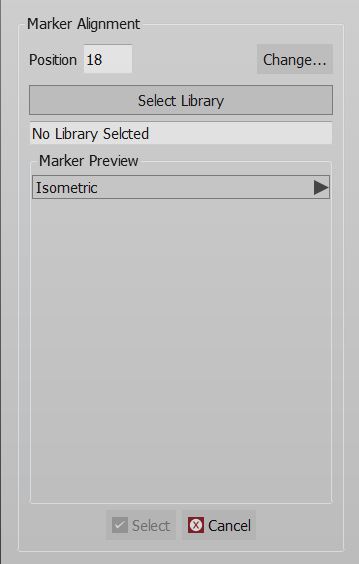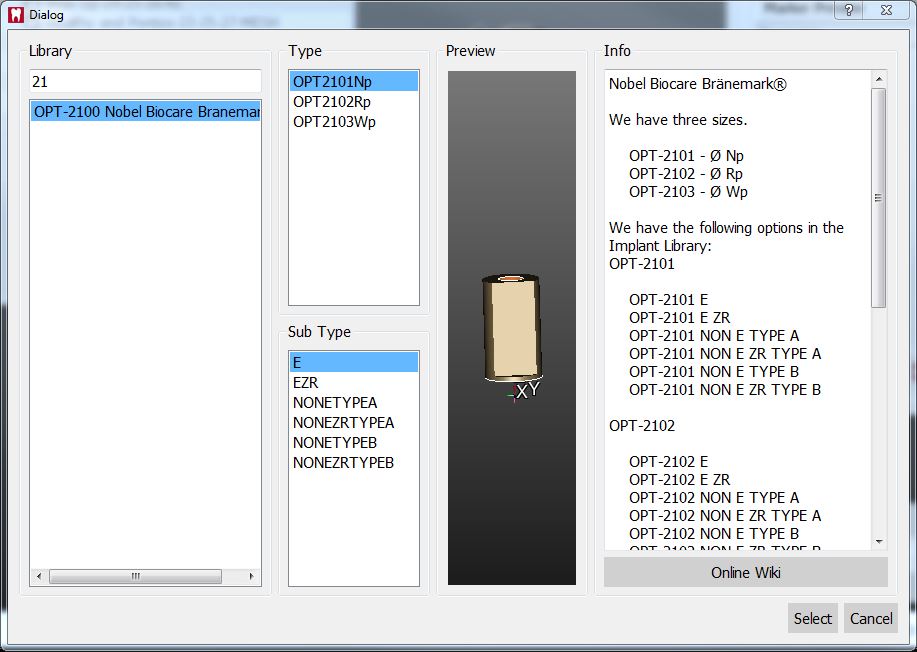Difference between revisions of "Man ImplantAlign/pt-br"
(Created page with "As malhas do marcador adquiridas terão de ser alinhadas com a forma do marcador da biblioteca. A partir destes dados a posição da conexão será computada.") |
|||
| (10 intermediate revisions by 3 users not shown) | |||
| Line 1: | Line 1: | ||
{{Language bar}} | {{Language bar}} | ||
| − | {{DISPLAYTITLE: | + | {{DISPLAYTITLE:Marker Alignment|noerror}} |
| − | = | + | = Marker Acquisition = |
| − | + | When acquiring the data for a project on implants, acquiring the implant itself is problematic. It's not like a stump or a piece of stone model. The implant connections/interfaces are normally small and metallic. | |
Além disso, o encaixe tem que ser mecanicamente perfeito, sem margem de erro. | Além disso, o encaixe tem que ser mecanicamente perfeito, sem margem de erro. | ||
| − | + | To solve this problem, the implant connection is not directly scanned but an '''Implant Marker or Scan Body''' is used in its stead. A Scan Body is a specific object, designed to be scanned, which fits exactly over the implant. | |
| − | + | The scan of the implant marker itself is not enough: its resulting data will be used to compute the exact position of the implant interface. In order to carry out this operation, an [[Implant_Library|Implant Library]] is needed . | |
O alinhamento com a biblioteca de implante pode ser realizada no software CAD. No entanto, usando uma biblioteca de implantes para a Plataforma de Exocad, o usuário pode executar essa operação diretamente no software de escaneamento OpticalRevEng Dental, a fim de obter melhores resultados. | O alinhamento com a biblioteca de implante pode ser realizada no software CAD. No entanto, usando uma biblioteca de implantes para a Plataforma de Exocad, o usuário pode executar essa operação diretamente no software de escaneamento OpticalRevEng Dental, a fim de obter melhores resultados. | ||
| Line 15: | Line 15: | ||
= Seleção de Implantes = | = Seleção de Implantes = | ||
| − | + | After the mesh generation, by selecting the mesh of an implant marker from the project tree, the ''Marker Alignment'' button will appear in the [[Main_Toolbar|Main Toolbar]]. | |
| − | + | Click on this button to open the ''Implant Selection'' dialog. | |
| − | + | [[File:Dental_3_5_implantSelection.JPG]] | |
| − | + | In this Dialog there are: | |
| − | # | + | # A tooth position selection (Change ...) that can be used only in [[Free_Mode|Free Mode]] to select the tooth position of an implant |
| − | # | + | # A '''Select Library''' button, that opens the Library Selection Panel |
| − | # | + | # A Marker Preview menu that, once the appropriate connection has been selected for the current element, will show the STL of the marker present in the library. It is possible to choose different views to check the Merker's shape |
| − | + | To continue with the Marker selection click on the '''Select Library''' Button. The '''Implant Selection Panel''' will open. The Panel is divided in 4 Sections | |
| − | + | [[File:Dental_3_5_implantSelectionPanel.JPG]] | |
| − | * | + | '''Library''' |
| − | * | + | |
| − | * | + | For choosing the general connection and implant family, contains: |
| + | |||
| + | # A Filter box where it is possible to write part of the name of the needed implant. All the implants that match the name will be showed in the implant list | ||
| + | # An implant list with all the implants available in the current Implant Library | ||
| + | |||
| + | '''Type and Sub Type''' | ||
| + | |||
| + | For Choosing the diameter and type of connection. There can be many of these types, in our libraries for instance there are: | ||
| + | |||
| + | * Engaging Connections : the connection can not rotate on the implant, suggested for abutments or single restorations | ||
| + | * Not-Engaging Connections : the connection can rotate on the implant, suggested for bars and bridges | ||
| + | * For Zirconia : connections with specific shapes, suited for zirconia restorations | ||
| + | |||
| + | '''Preview''' | ||
| + | |||
| + | Shows the preview of the STL marker present in the library | ||
| + | |||
| + | '''Info''' | ||
| + | |||
| + | If the library is correctly configured to work with our software, in this section it is possible to have a small overview of the libraries with additional information on the availabe diameters and implant types. | ||
| + | All our libraries are provided with this feature and, being connected to this wiki, the ''Open in browser'' button opens the wiki on the implant list page. | ||
| + | |||
| + | To accept the implant selection click on ''Select'', otherwise ''Cancel''. | ||
Se o implante errado for selecionado, é possível repetir o procedimento para substituir a antiga conexão alinhada com uma nova. | Se o implante errado for selecionado, é possível repetir o procedimento para substituir a antiga conexão alinhada com uma nova. | ||
| Line 38: | Line 60: | ||
'' 'Se o desenho CAD é lançado usando uma conexão errada, será necessário reiniciar todo o projeto desde o início' '' | '' 'Se o desenho CAD é lançado usando uma conexão errada, será necessário reiniciar todo o projeto desde o início' '' | ||
| − | = | + | = Marker Alignment = |
| − | Ao selecionar a conexão de implante, o software irá iniciar o modo [[ | + | Ao selecionar a conexão de implante, o software irá iniciar o modo [[Man_Align#Manual Alignment|Alinhamento Manual]] . |
| − | + | The acquired marker mesh will need to be aligned to the library marker shape. From this data the connection position will be computed. | |
| − | + | Este procedimento tem de ser realizado para cada implante do projeto. O [[Man_DataExport|CAD Export]] irá emitir um aviso se um ou mais alinhamentos de implantes estão faltando. | |
{{Navigation|Man_MeshEditing|Man_DataExport}} | {{Navigation|Man_MeshEditing|Man_DataExport}} | ||
Latest revision as of 10:17, 21 June 2016
Marker Acquisition
When acquiring the data for a project on implants, acquiring the implant itself is problematic. It's not like a stump or a piece of stone model. The implant connections/interfaces are normally small and metallic.
Além disso, o encaixe tem que ser mecanicamente perfeito, sem margem de erro.
To solve this problem, the implant connection is not directly scanned but an Implant Marker or Scan Body is used in its stead. A Scan Body is a specific object, designed to be scanned, which fits exactly over the implant.
The scan of the implant marker itself is not enough: its resulting data will be used to compute the exact position of the implant interface. In order to carry out this operation, an Implant Library is needed .
O alinhamento com a biblioteca de implante pode ser realizada no software CAD. No entanto, usando uma biblioteca de implantes para a Plataforma de Exocad, o usuário pode executar essa operação diretamente no software de escaneamento OpticalRevEng Dental, a fim de obter melhores resultados.
Seleção de Implantes
After the mesh generation, by selecting the mesh of an implant marker from the project tree, the Marker Alignment button will appear in the Main Toolbar. Click on this button to open the Implant Selection dialog.
In this Dialog there are:
- A tooth position selection (Change ...) that can be used only in Free Mode to select the tooth position of an implant
- A Select Library button, that opens the Library Selection Panel
- A Marker Preview menu that, once the appropriate connection has been selected for the current element, will show the STL of the marker present in the library. It is possible to choose different views to check the Merker's shape
To continue with the Marker selection click on the Select Library Button. The Implant Selection Panel will open. The Panel is divided in 4 Sections
Library
For choosing the general connection and implant family, contains:
- A Filter box where it is possible to write part of the name of the needed implant. All the implants that match the name will be showed in the implant list
- An implant list with all the implants available in the current Implant Library
Type and Sub Type
For Choosing the diameter and type of connection. There can be many of these types, in our libraries for instance there are:
- Engaging Connections : the connection can not rotate on the implant, suggested for abutments or single restorations
- Not-Engaging Connections : the connection can rotate on the implant, suggested for bars and bridges
- For Zirconia : connections with specific shapes, suited for zirconia restorations
Preview
Shows the preview of the STL marker present in the library
Info
If the library is correctly configured to work with our software, in this section it is possible to have a small overview of the libraries with additional information on the availabe diameters and implant types. All our libraries are provided with this feature and, being connected to this wiki, the Open in browser button opens the wiki on the implant list page.
To accept the implant selection click on Select, otherwise Cancel.
Se o implante errado for selecionado, é possível repetir o procedimento para substituir a antiga conexão alinhada com uma nova.
'Se o desenho CAD é lançado usando uma conexão errada, será necessário reiniciar todo o projeto desde o início'
Marker Alignment
Ao selecionar a conexão de implante, o software irá iniciar o modo Alinhamento Manual .
The acquired marker mesh will need to be aligned to the library marker shape. From this data the connection position will be computed.
Este procedimento tem de ser realizado para cada implante do projeto. O CAD Export irá emitir um aviso se um ou mais alinhamentos de implantes estão faltando.




